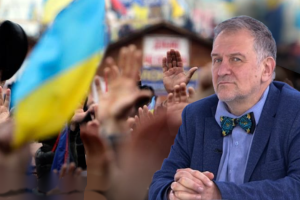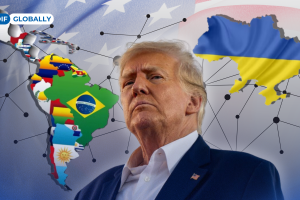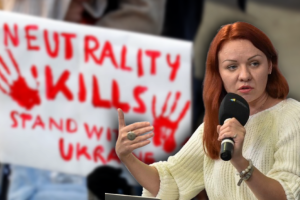This policy brief was prepared exclusively for "Rubryka"
International Developments
- Ukrainian European allies intensify their efforts to provide military assistance to ensure Ukraine is fully prepared for the coming counteroffensive and is eventually victorious.
The EU support training mission is expected to complete training for 11,000 Ukrainian military personnel, growing to 30,000 by the end of 2023. Also, according to the High Representative of the Union for Foreign Affairs and Security Policy Josep Borrell, the EU is planning to allocate €1 bln from the EU Peace Fund to pay for increased ammo supplies to Ukraine.
NATO Secretary General Jens Stoltenberg stressed the need for further practical steps to coordinate ammo supplies for Ukraine, initiating the discussions of the new, increased ammo stock limits for the Allies.
- A number of the Western media (starting with the New York Times) published reports with selective leaks of intelligence about the possibility that "a pro-Ukrainian group" might have been behind the explosion. In contrast, involvement of US or British intelligence was ruled out completely.
Immediately, the russian president's spokesperson Peskov reacted that such claims were false since russia was purposefully removed from the investigation process. Moreover, Kremlin repeated accusations of the US behind the explosions.
It must be said that since September 2022, Germany, Denmark and Sweden have been investigating the attack on the Nord Stream – 1-2 pipelines that eventually destroyed those. The official investigation explores several versions, including the participation of non-state actors. However, all countries involved in investigations testified before the UN Security Council that it was not concluded.
Therefore, leaks of these versions in the US media can be a move in countering russian propaganda and disinformation on the topic. Germany has denied russia a chance to take the lead in public spreading the version of Ukrainian involvement in the attack, forcing the kremlin propaganda machine to react.
- The EU initiated maritime patrol missions and international military exercises to protect the international critical infrastructure and to counter russian hostile and espionage activities.
The new EU maritime strategy is expected to be finalized in the coming days. It is going to envision (1) yearly naval international military exercises, (2) an increased number of maritime military and coast guard patrols and (3) closer security coordination between the European nations.
The EU is preparing for long-term strategic competition with russia. It consolidates efforts and resources not only to counter current threats and challenges but also to transform the European security system to address the new security reality in the region and on a global scale.
The initiative comes as a direct response to the investigation of the Nord Stream bombing, which, if not adequately addressed in terms of preventing further similar threats, could potentially endanger other international critical infrastructure installations, such as global communication lines.
- Upon return from an official visit to China, Belarus' self-proclaimed president Lukashenko gave his official remarks on the incident in Machulishchy military air base, where Russian A-50 AWACS-like aircraft was damaged in a drone attack. Lukashenko predictably tied the attack, which was attributed later by the Belarus insurgency group, to Ukraine and the United States. At the same time, he mainly focused on Belarus's domestic issues. As expected, he will use the incident to tighten control over the domestic situation further, also citing the russian RDK insurgent group operation in the Briansk region.
War/Security Situation
- russia carried out another massive missile attack against civilian and critical infrastructure targets in Ukraine on the night of March 8-9.
This time russia fired 6 "Kinzhal" aeroballistic missiles – the biggest number of them fired in one attack so far. Russian military seems desperate in need to overcome Ukrainian air defenses, which are getting more and more advanced and sophisticated, having its missile stockpiles running dry. russians are also trying to inflict as much damage to Ukrainian civilian/critical infrastructure as they can before Ukraine deploys Patriot SAM batteries capable of dealing with hypersonic weapons as well.
russian state-run propaganda officially tied the attack to the incident in Briansk region involving the russian-led RDK group, another sign that it lacks any significant battlefield successes to talk about. Besides its domestic propaganda value, russian missile attack seemed to test the new combination of missiles utilized.
- The strategic calculations by Ukrainian military leadership to use the siege of Bakhmut to divert and drain russian forces seems to pay off. Starting March 6 alone russian forces have lost more than 2500 personnel, 1100 of them killed in action and dozens of armor and artillery pieces.
According to the US Intelligence Community estimates, russian forces would be unable to compensate for their losses in manpower and equipment and are not expected to be able to achieve any significant results this year. NATO intelligence estimates that for every Ukrainian soldier killed defending Bakhmut, russian forces have lost at least five.
russian forces' efforts to capture Bakhmut had significantly deteriorated their capacity for other offensives.
Conclusions and Recommendations
- Ukrainian European allies intensify their efforts to provide military assistance to ensure Ukraine is prepared for the coming counteroffensive and is eventually victorious. Ukraine must continue close coordination of its efforts with the allies to ensure that (1) both Ukrainian Armed Forces demands are constantly met, and (2) the Western allies maintain their necessary combat readiness level to be able to continue to efficiently support Ukraine without any unnecessary security and/or political risks.
- Media and public disclosure of the Nord Stream attack investigation versions seems to be a move by the West to counter russian propaganda and disinformation on the topic.
- The new EU initiative to start maritime patrol missions, international military exercises, and the new EU naval strategy can be another move to join efforts with NATO to protect the critical international infrastructure and counter russian hostile and espionage activities. Ukraine has to follow the developments closely and take an active part where it can effectively contribute to the joint effort to counter russian hybrid and terrorist tactics it actively employs in Ukraine.
- The reaction of the self-proclaimed Belarus president Lukashenko to the incident in Machulishchy Russian air base shows that his priority remains on tightening his grip on the domestic situation rather than following putin's demands to get more actively involved in russian war against Ukraine. With his official visit to China and the announced visit to Iran, Lukashenko is sticking to his strategy of turning Belarus into a logistics and military-industrial hub to enforce russian war efforts rather than a direct battlefield ally to the Kremlin. This is the only way for Lukashenko to try to successfully safeguard his personal and political security in the current situation.
- russian massive missile strike carried out this week demonstrated a shift in tactics in anticipation of further strengthening of Ukrainian air defenses. It also seems to explore new approaches in terms of (1) russian cruise missile stockpiles running dry, (2) Iran hesitation in sending russia its ballistic missiles, and (3) preparations for russian major offensive operations. Ukraine should further exploit this russian move to negotiate more air defense capabilities (including modern fighter jets) with the West.
- The strategic calculations by Ukrainian military leadership to use the siege of Bakhmut to divert and drain russian forces seems to pay off. Key Ukrainian Western allies agree with the estimates and stress that russian forces' efforts to capture the city had significantly deteriorated their capacity for other offensives. Ukraine, on its part, needs to mobilize Western nations further to intensify military assistance to allow the Ukrainian Armed Forces to turn their tactical gains in Bakhmut into strategic initiative in the coming major counteroffensive.
______________________________________
This policy brief was prepared exclusively for "Rubryka" as part of a project "russia-Ukraine Conflict: from Full-Scale War to Conflict Resolution and Post-War Reconstruction" implemented in cooperation with the Razumkov Centre with the support of the MATRA program of the Embassy of the Netherlands. The opinions expressed are those of the author(s) only and should not be considered as representative of the Embassy's official position.








